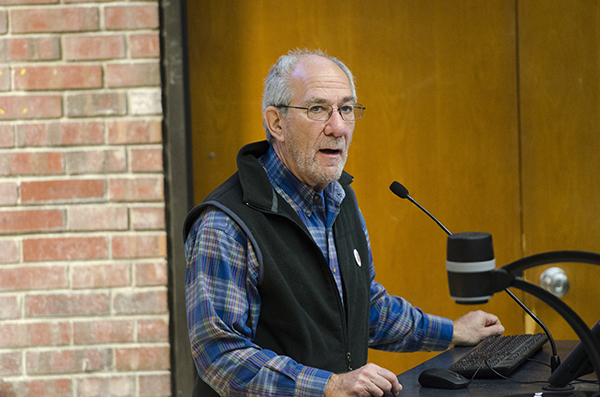

Six departments and programs at SUNY New Paltz have passed a Resolution for the Fair Pay Act, which calls on administrators to help improve work conditions for University faculty members.
The elementary education, anthropology, art history, library, sociology departments and the Women’s, Gender, and Sexuality Studies program have all agreed to the resolution, which was drawn up by university faculty members. It calls for salary increases for tenure-track faculty members, smaller course-loads for full-time lecturers and an increase in the minimum pay for adjunct professors.
Art History Lecturer Beth Wilson said the resolution is a statement from the faculty which demonstrates that regardless of position, lecturers, adjuncts and tenure-track professors have interest and stake in one another’s issues.
“I think what the administration would prefer us to do is to disconnect these issues,” Wilson said. “I think the compelling thing about the resolution is it recognizes the connection between the three groups.”
One of the issues brought up in the resolution is that tenure-track professors have not received a Direct Salary Increase (DSI) for several years, including the time when United University Professors (UUP) and New York State were negotiating a new contract, between 2011 and 2013. This includes professors who were reviewed and were qualified to receive a DSI in that time.
The resolution claims that the campus president, in neither the past or present agreements betwen UUP and the state, is precluded from awarding salary increases. However, SUNY New Paltz President Donald Christian said he is unable to accomplish what is being asked of him.
“That’s a provision in the contract that lets me adjust an individual salary here and there on a very limited basis,” Christian said. “It is not a mechanism for whole scale faculty increases and it is not a mechanism that gives me the ability to give major salary increases.”
Christian also said he is unable to give into the demands of the resolution because it comes from the campus chapter of UUP, as opposed to the statewide union.
“It is very clear that the faculty collective bargaining agreement is negotiated between the governor’s office and statewide UUP, and employers are not given the right to negotiate with anybody else, including groups like a faculty senate and it is explicitly stated,” he said. “If faculty come to me with a resolution, there’s nothing I can do about it because it didn’t come from statewide UUP.”
The resolution also calls for an increase in the minimum adjunct pay, which is $3,001 per course at SUNY New Paltz. According to Christian, New Paltz has the highest minimum pay for adjuncts, with Stony Brook and SUNY Potsdam having nearly similar minimums with $3,000 per course.
But Wilson said it isn’t so much the pay as it is that in some cases, adjuncts are doing the same amount of work as some tenure-track faculty members and “salaried” lecturers.
“What we’re truly looking for is equal pay for equal work,” Wilson said. “There are adjuncts who teach three to four classes, and they’re asked to put in the same amount of work as full-time professors when they aren’t full time.”
The final issue the resolution discusses is the course load for full-time lecturers at SUNY New Paltz. The resolution states that New Paltz “is unique among SUNY comprehensive colleges in having an academically indefensable course load of five courses […] per semester for its full-time lecturers.”
UUP Chapter President Peter Brown said the amount of work full-time lecturers are asked to fulfill leaves them “burned out” by the time the semester is over.
“Lecturers are asked to put in 15 credit hours per semester, and on top of that they are expected to do outside research,” Brown said. “It leaves them depleted by the end of the semester and this ultimately has a negative effect on both faculty and students.”
The resolution asks that the University lower the course load to four courses per semester, which is what other SUNY schools such as Cortland offer.
President Christian said in his October report to faculty members that while the “nominal” course load is “equivalent to 15 credits per semester,” most lecturers do less than that.
However, that doesn’t stop the overall climate and morale of the faculty from being “extremely low,” Brown said.
“I’ve worked here for a long time and this is the lowest I’ve ever seen morale,” Brown said. “There’s a real climate of fear here where people are afraid of losing their jobs or being passed over for promotions or not getting a line in their budgets. People are looking elsewhere for jobs. I know we need to look into hiring new faculty, but we also need to focus on keeping the ones we have.”
